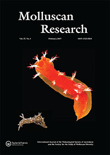
MOLLUSCAN RESEARCH
Scope & Guideline
Unveiling the Secrets of Molluscan Ecology
Introduction
Aims and Scopes
- Taxonomy and Systematics:
Research articles focusing on the classification, description, and phylogenetic relationships among molluscan species, including the discovery of new species and revisions of existing taxa. - Ecology and Environmental Adaptations:
Studies examining the ecological roles of mollusks in their habitats, their responses to environmental changes, and their adaptations to various ecological niches. - Physiology and Biochemistry:
Investigations into the physiological processes of mollusks, including studies on haemolymph parameters, growth patterns, and metabolic adaptations to stressors. - Conservation and Management:
Research addressing the conservation status of molluscan species, the impacts of invasive species, and strategies for sustainable management of molluscan resources. - Aquaculture and Cultivation Techniques:
Articles exploring methods for the cultivation of mollusks, including breeding practices, growth performance, and the effects of environmental conditions on molluscan farming. - Evolutionary Biology:
Studies investigating the evolutionary history of mollusks, including genetic variation, reproductive strategies, and morphological adaptations.
Trending and Emerging
- Molecular Genetics and Genomics:
There is an increasing emphasis on molecular techniques, including transcriptome and mitogenomic analyses, to resolve taxonomic ambiguities and understand genetic diversity among mollusks. - Invasive Species Research:
A growing focus on the impacts of invasive molluscan species on native ecosystems and biodiversity, highlighting the need for management strategies and ecological assessments. - Climate Change Effects on Mollusks:
Research investigating the effects of climate change on molluscan populations and their habitats is trending, reflecting the urgent need to understand how these organisms adapt to changing environments. - Conservation Biology and Restoration Ecology:
There is a heightened interest in conservation strategies, including captive breeding programs and habitat restoration, aimed at protecting threatened molluscan species. - Aquaculture Innovations:
Emerging studies are focusing on innovative aquaculture practices and sustainable farming techniques for economically important molluscan species, responding to global food security challenges.
Declining or Waning
- Traditional Morphological Studies:
There has been a noticeable decrease in purely morphological studies without molecular analysis, possibly due to the increasing reliance on molecular techniques for taxonomic and phylogenetic investigations. - Geographic Distribution Studies in Established Regions:
Research focusing on the geographic distribution of mollusks in well-studied regions has become less frequent, indicating a shift towards exploring less-explored areas or the impacts of climate change on distribution. - Laboratory-Based Physiological Studies:
While physiological studies remain important, there is a decline in laboratory-based investigations in favor of field studies that assess molluscan responses to natural environmental conditions. - Historical and Paleontological Studies:
Papers dedicated to historical and paleontological perspectives on mollusks have decreased, suggesting a shift towards contemporary ecological and conservation issues.
Similar Journals

RUSSIAN JOURNAL OF THERIOLOGY
Connecting Researchers in Animal Science and EcologyRUSSIAN JOURNAL OF THERIOLOGY is a prominent academic journal published by KMK SCIENTIFIC PRESS LTD in collaboration with the esteemed Moscow State University. As a dedicated platform for researchers in the fields of Animal Science and Zoology, Ecology, Evolution, Behavior and Systematics, and Plant Science, this journal strives to advance our understanding of terrestrial ecosystems and their inhabitants. Although it currently holds a Q4 ranking and ranks within the lower percentiles of its respective categories, the journal's consistent publishing output since 2011 showcases a commitment to facilitating scientific discourse and collaboration. Addressed to a diverse audience of researchers, professionals, and students, RUSSIAN JOURNAL OF THERIOLOGY serves as an essential resource for disseminating valuable insights and fostering future advancements in the biological sciences.
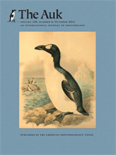
Ornithology
Fostering Collaboration in Avian Research.Ornithology, published by Oxford University Press Inc, is a premier journal dedicated to the field of avian biology, offering a platform for researchers, professionals, and students to share groundbreaking findings in the study of birds. With an impressive impact factor and ranking in the Q1 quartile for both Animal Science and Zoology, as well as Ecology, Evolution, Behavior, and Systematics, Ornithology serves as a vital resource for advancing our understanding of avian species and their ecological roles. The journal allows open access viewing, broadening the reach and impact of published research. Covering comprehensive studies from 1982 to 2023, it facilitates collaboration and innovation within the global ornithological community. Engaging with Ornithology not only elevates your research profile but also contributes to the rich tapestry of knowledge concerning the world's diverse bird populations.
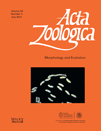
ACTA ZOOLOGICA
Illuminating the Path of Animal EcologyACTA ZOOLOGICA, published by WILEY, is a distinguished journal that serves as an essential resource for researchers and professionals in the fields of Animal Science, Zoology, Cell Biology, and Ecology. With its ISSN 0001-7272 and E-ISSN 1463-6395, this journal has been contributing to the scientific community since 1920 and continues to explore new dimensions in zoological research. As of 2023, it holds an impactful position with a Q3 ranking in Animal Science and Zoology as well as Ecology, Evolution, Behavior and Systematics, signifying its relevance and emerging influence in these domains. Although it is not an Open Access journal, ACTA ZOOLOGICA remains committed to disseminating high-quality research and facilitating scholarly discussions among its audience. The journal aims to publish original articles, reviews, and critical findings that enhance understanding of animal biology and conservation, addressing global ecological challenges. Its rankings in Scopus further underscore its scholarly reputation, making it a valuable addition to the libraries of institutions and individuals alike.

AoB Plants
Connecting researchers to cultivate knowledge.AoB Plants is a distinguished open-access journal published by Oxford University Press, dedicated to advancing the field of plant science. Since its inception in 2009, this journal has played a pivotal role in disseminating high-quality research that encompasses a wide range of topics including plant biology, ecology, and biotechnology. With an impressive impact factor and a ranking in the Q1 quartile for Plant Science, AoB Plants is recognized for its innovative contributions and scholarly rigor, ranking #129 out of 516 in the Scopus Agricultural and Biological Sciences category, placing it in the 75th percentile among its peers. By promoting open-access availability of research findings, the journal empowers researchers and practitioners alike, facilitating greater collaboration and knowledge sharing in the global scientific community. Situated in the heart of the United Kingdom, AoB Plants continues its commitment to providing a platform for pioneering research and developments in plant science, thus fostering a deeper understanding of the crucial roles that plants play in our ecosystems and economies.
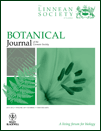
BOTANICAL JOURNAL OF THE LINNEAN SOCIETY
Exploring the Frontiers of Plant Science and EcologyThe Botanical Journal of the Linnean Society, published by Oxford University Press, stands as a premier platform for interdisciplinary research within the realms of Ecology, Evolution, Behavior, and Plant Science. With a notable impact factor reflective of its esteemed reputation, this journal is classified in the Q1 quartile for both Ecology and Plant Science, placing it among the most influential publications in these fields. Since its inception in 1969, and with an anticipated convergence of research extending to 2024, it has become essential for scholars and professionals seeking to engage with cutting-edge studies, theoretical frameworks, and practical applications that drive our understanding of plant biology and ecological systems. The journal’s commitment to excellence is underscored by its robust Scopus rankings—achieving an impressive 83rd percentile in Ecology and a 82nd percentile in Plant Science. This makes the Botanical Journal of the Linnean Society a crucial resource for researchers, educators, and students alike, eager to advance their knowledge and contribute to the evolving discourse in botany and environmental studies.
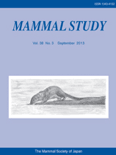
MAMMAL STUDY
Exploring the diverse world of mammals and their ecosystems.Mammal Study, published by the Mammalogical Society of Japan, is a leading academic journal dedicated to the field of mammalogy and related biological sciences. Since its inception, it has provided a critical platform for researchers, professionals, and students to share their findings and insights into the diverse facets of mammalian biology, ecology, and conservation. The journal, with ISSN 1343-4152 and E-ISSN 1348-6160, is recognized for its rigorous peer-review process and has attained a commendable Q3 ranking in the 2023 category of Animal Science and Zoology. With an impact factor reflecting its growing influence—ranking 283 out of 490 in Scopus—we welcome contributions that advance the understanding of mammalian species and their habitats. While access to published articles is through traditional channels, the journal aims to reach an even wider audience by fostering greater awareness and appreciation for mammalian research and conservation efforts. The Mammal Study has converged years of insightful publications from 2008 to 2024, solidifying its position as a vital resource in the biological sciences.
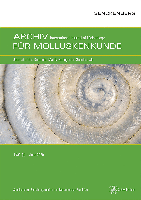
ARCHIV FUR MOLLUSKENKUNDE
Unveiling the Wonders of Mollusk DiversityARCHIV FUR MOLLUSKENKUNDE, published by E SCHWEIZERBARTSCHE VERLAGSBUCHHANDLUNG, is a premier journal dedicated to the study of mollusks, covering a broad spectrum of topics from taxonomy and ecology to conservation and biodiversity. With its commitment to advancing knowledge and fostering collaboration within the malacological community, this journal serves as an essential resource for researchers, professionals, and students alike. Though it is not currently operated under an open-access model, it provides valuable insights and the latest findings in the field, making it indispensable for those involved in mollusk research. Scholars can access the journal's rich repository of articles, ensuring their work remains at the forefront of scientific inquiry. The journal operates out of Stuttgart, Germany, further emphasizing its European scholarly tradition in the environmental and biological sciences.

BELGIAN JOURNAL OF ZOOLOGY
Elevating Zoological Research to New Heights.The BELGIAN JOURNAL OF ZOOLOGY, published by the Royal Belgian Zoological Society, serves as a prominent platform for advancing research in the field of zoology. With an impact factor reflecting its status within the academic community, this journal rigorously publishes innovative studies and reviews, covering a broad spectrum of topics related to animal science and zoology. As an esteemed outlet, the journal ranks in the Q2 category for both Animal Science and Zoology, demonstrating its relevance and contribution to the field, as indicated by its Scopus ranking of 255 out of 490. Although it operates under a subscription model, the journal is committed to disseminating high-quality research that can shape contemporary understanding of animal biology and ecology. With a publication history dating back to 1990 and extending through 2024, researchers, professionals, and students are encouraged to engage with its rich content, which is vital for ongoing discourse and discovery within zoological sciences.

Avian Biology Research
Fostering a deeper understanding of our feathered friends.Avian Biology Research, published by SAGE PUBLICATIONS LTD, is a leading journal dedicated to advancing the study of avian species through high-quality, peer-reviewed research. With an ISSN of 1758-1559 and an E-ISSN of 1758-1567, this journal has established itself as a vital resource within the fields of Animal Science and Zoology, as well as Ecology, Evolution, Behavior, and Systematics. The journal is currently ranked Q3 in both categories according to the 2023 release of the category quartiles, and it contributes significantly to the global understanding of avian biology, including behavior, physiology, and conservation efforts. Positioned within the competitive landscape of the Scopus rankings, it finds itself amidst a diverse array of research, with medical and environmental implications. As an open-access journal, Avian Biology Research ensures greater accessibility to its contents, fostering disseminative opportunities for researchers, professionals, and students alike. With a publication window spanning from 2008 to 2024, it continues to be an invaluable platform for the dissemination and dialogue of avian research, thereby enlightening future inquiries and driving scientific advancements in this crucial area of biology.

ADANSONIA
Innovating research in the heart of plant biology.ADANSONIA is a distinguished, peer-reviewed open access journal dedicated to advancing the field of plant science. Published by the Publications Scientifiques du Museum in Paris since 2000, this journal serves as a critical platform for sharing innovative research and discoveries in botany, ecology, and related disciplines. With its ISSN 1280-8571 and E-ISSN 1639-4798, ADANSONIA boasts a notable Scopus rank of #383 in the Agricultural and Biological Sciences category and a 2023 category quartile ranking of Q3 in Plant Science, indicating a meaningful contribution to the academic community. The journal's scope encompasses a broad range of topics, making it a vital resource for researchers, professionals, and students alike who are exploring the complexities of plant biology. Based in France, ADANSONIA not only enhances visibility for groundbreaking research but also facilitates open communication amongst scholars, ensuring that knowledge on plant science is accessible worldwide. Located at CP 39-57, Rue Cuvier, F-75231 Paris Cedex 05, France, this journal stands as a testament to the collaborative efforts in the pursuit of scientific excellence in plant sciences.